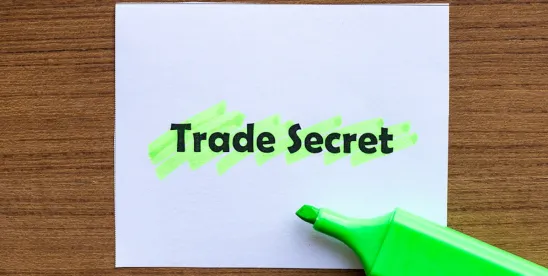Last summer, in a case of first impression, the U.S. Court of Appeals for the Seventh Circuit in Motorola Solutions, Inc. v. Hytera Communications Corporation Ltd held that the Defend Trade Secrets Act (the “DTSA”) rebuts the presumption against extraterritoriality—i.e., the principle that federal statutes should not be applied to conduct occurring outside of the United States, unless Congress explicitly states otherwise. 108 F.4th 458, 483 (7th Cir. 2024).
The Motorola court held that the DTSA applies to individuals and entities who are not located in the United States insofar as an “act in furtherance” of the misappropriation “was committed in the United States.” 18 U.S.C. § 1837(2). In construing what constitutes an “act in furtherance” of misappropriation, the Motorola court determined that the defendant, a Chinese company, had committed an “act in furtherance” of the misappropriation by marketing products embodying defendant’s stolen trade secrets via road shows and advertising activities it conducted in the United States. Id. 480-88.
A recent decision from the Northern District of Illinois continues to develop the DTSA’s “act in furtherance” element. In GTY Technology Holdings Inc. v. Euna Solutions, the court considered whether the DTSA applied to a Canadian citizen defendant, who had worked remotely for a Chicago-based company before he and his codefendant allegedly misappropriated plaintiffs’ trade secret information. No. 24-CV-9069, *8 (N.D. Ill. May 21, 2025). Plaintiffs alleged that defendant had engaged in conduct in the United States when, prior to his downloading the documents, he visited Chicago and discussed the documents with his codefendant. Id. Defendant moved to dismiss the DTSA claims, arguing that the statute did not apply to him because he was in Canada when he allegedly downloaded the plaintiffs’ documents, thereby allegedly committing the act of misappropriation outside of the U.S. Id.
Defendant and plaintiffs each relied on the following passage from Motorola, “drawing different meaning from the opinion’s discussion of what ‘in furtherance’ means”:
Applied to the DTSA . . . the act in furtherance of the offense of trade secret misappropriation need not be the offense itself or any element of the offense, but it must manifest that the [offense] is at work and is not simply a project [...] in the minds of the offenders or a fully completed operation. Put another way, an act that occurs before the operation is underway or after it is fully completed is not an act in furtherance of the offense.
Id. quoting Motorola, 108 F.4th at 487.
Defendant argued that the key portion of the passage is that “an act that occurs before the operation is underway or after is fully completed is not an act in furtherance of the offense.” Id. at *8. Defendant contended that if his downloading of the documents was the act of misappropriation, then any communication he had with his codefendant prior to such conduct is not an “act in furtherance.” Id.
Plaintiffs, on the other hand, focused on the following sentence from the passage: “[A]n act in furtherance of the offense of trade secret misappropriation need not be the offense itself or any element of the offense, but it must manifest that the offense is at work and is not simply a project.” Id. Consequently, plaintiffs argued that by discussing the trade secret information with his co-defendant in Chicago, defendant’s misappropriation was “at work.” Id.
Agreeing with plaintiffs’ interpretation, the GTY Technology court held that plaintiffs had satisfactorily alleged that defendant committed an “act in furtherance” of misappropriation by virtue of his alleged visit to Chicago and his communications about the trade secret information to his Chicago-based co-defendant. Id. The court explained that such conduct amounted to “steps taken to steal supposedly confidential business information” and that “because these steps were directed” at a Chicago-based company “and/or occurred in Chicago,” the DTSA applied to the Canada-based defendant’s conduct. Id.
Motorola and GTY Technology indicate that, while this area of the law is developing, courts are willing to interpret the DTSA expansively to permit a plaintiff to bring a claim under the DTSA against a foreign defendant, even when most of the defendant’s conduct occurs outside of the United States. Trade secret plaintiffs should consider the availability of the DTSA and a United States forum to prosecute their claims against foreign defendants.




 />i
/>i

